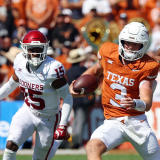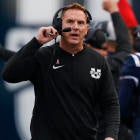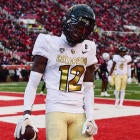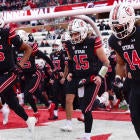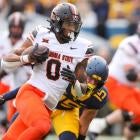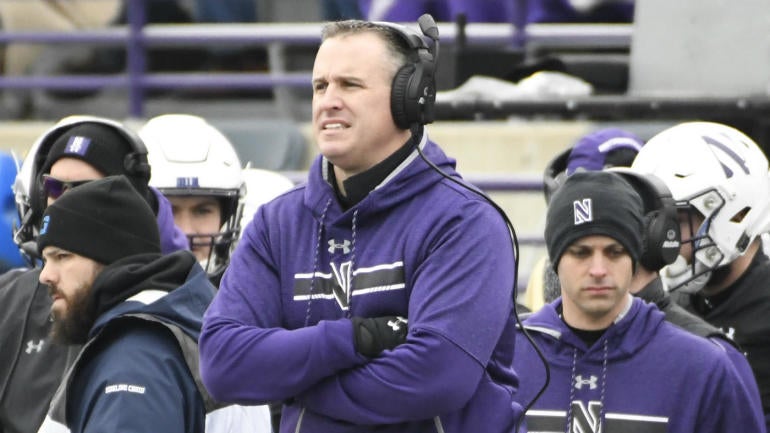
Northwestern has fired coach Pat Fitzgerald days after details surfaced alleging graphic instances of hazing within the program, the school announced Monday night. Fitzgerald's departure comes three days after he was initially suspended without pay for two weeks. However, university administrators opted to revisit his status with the program after two former players provided details of the hazing, which was sexual in nature, to The Daily Northwestern student newspaper. Defensive coordinator David Braun is expected to step in as a liaison managing the team before an interim coach is named, according to multiple reports.
An executive summary provided by Northwestern recapped an independent investigation that concluded there was not sufficient evidence to believe the Northwestern coaching staff knew about the hazing. Fitzgerald, who has served as head coach of his alma mater for 17 seasons, claimed that he was "not aware of the alleged incidents." However, as further details came to light through the weekend, university president Michael Schill announced Sunday night that he would reassess the penalty.
Less than 24 hours later as even more details of alleged hazing surfaced, Schill dismissed Fitzgerald.
"The decision comes after a difficult and complex evaluation of my original discipline decision imposed last week on Coach Fitzgerald for his failure to know and prevent significant hazing in the football program," said Schill in a statement. "Over the last 72 hours, I have spent a great deal of time in thought and in discussions with people who love our University -- the Chair and members of our Board of Trustees, faculty leadership, students, alumni and Coach Fitzgerald himself. I have also received many phone calls, text messages and emails from those I know, and those I don't, sharing their thoughts. While I am appreciative of the feedback and considered it in my decision-making, ultimately, the decision to originally suspend Coach Fitzgerald was mine and mine alone, as is the decision to part ways with him."
Northwestern has decided to keep the investigative report private. However, it revealed these findings from the investigation:
- Eleven current or former football players acknowledged systemic, ongoing hazing within the program.
- The hazing included "forced participation, nudity and sexualized acts of a degrading nature."
- The hazing was "well-known by many in the program," though it was not determined whether Fitzgerald was aware of it.
Northwestern is firing Fitzgerald "for cause" ESPN's Adam Rittenberg reports. Fitzgerald's attorney Dan Webb tells ESPN his team is evaluating litigation, citing "two different major breach of contract claims." That includes what Webb describes as an "oral agreement" between the two parties for a two-week suspension in wake of the allegations.
"Last Friday, Northwestern and I came to a mutual agreement regarding the appropriate resolution following the thorough investigation conducted by Ms. [Maggie] Hickey," Fitzgerald said. "This agreement stipulated a two-week suspension. Therefore, I was surprised when I learned that the president of Northwestern unilaterally revoked our agreement without any prior notification and subsequently terminated my employment."
Fitzgerald signed a 10-year contract with Northwestern in 2021, of which the university still owes him more than $40 million. Northwestern has not informed Fitzgerald of intentions to withhold payment on that agreement, ESPN reports.
Fitzgerald, 48, is a revered NU alumnus and one of the longest-tenured coaches in college football. A former Northwestern linebacker who gained entry to the College Football Hall of Fame following an exceptional career, he returned to lead the Wildcats for nearly two decades after spending five seasons as an assistant with the program.
Only Kirk Ferentz (Iowa), Mike Gundy (Oklahoma State) and Kyle Whittingham (Utah) have been head football coaches at their respective schools longer than Fitzgerald, who became the Wildcats' all-time winningest coach by a wide margin. The 2018 Big Ten Coach of the Year led Northwestern to three 10-3 seasons (2012, 2015, 2017) and two appearances in the Big Ten Championship Game (2018, 2020).
The primary type of hazing for which Northwestern has been accused of perpetuating is known as "running," a punishment for team members -- mostly freshmen -- that make a mistake in practice or another football setting. An athlete selected for "running" would allegedly be restrained by a group of upperclassmen and "dry-humped" in a dark locker room, former players told The Daily.
Teammates commonly identified players for "running" by clapping their hands above their heads around that player, a motion Fitzgerald is accused of making occasionally during practices. One player who spoke with The Daily believes that others interpreted that as Fitzgerald "encouraging" the hazing. That suggestion was at odds with the independent investigation conducted by former Illinois inspector general Maggie Hickey, who found evidence of hazing but not of Fitzgerald's direct involvement.
There were also accusations of freshmen being forced to perform additional hazing acts while naked. Among them were a so-called "car wash" where a player would stand at the entrance of the team shower forcing others entering the showers to rub against them on the way in.
Fitzgerald's firing comes not only amid accusations of hazing and an alleged racist culture within the program but off the program's worst two seasons on the field since he began leading the team. The Wildcats went 3-9 in 2021 and 1-11 in 2022 with a combined 2-16 mark in Big Ten play.
"The head coach is ultimately responsible for the culture of his team. The hazing we investigated was widespread and clearly not a secret within the program, providing Coach Fitzgerald with the opportunity to learn what was happening. Either way, the culture in Northwestern Football, while incredible in some ways, was broken in others," Schill said.
Having demonstrated unwavering loyalty to Northwestern despite interest from both college and professional teams, Fitzgerald had built up enough equity to survive that horrendous two-year stretch, which would have spelled the end for almost any other Power Five coach.
With Big Ten Media Days set to begin July 26 in Indianapolis, the saga puts an already struggling Northwestern program in an unenviable position. The Wildcats continue to seek ways to succeed in an evolving collegiate sports landscape as an elite, private academic institution.
Northwestern is pursuing a proposed $800 million upgrade to Ryan Field and stands well-positioned financially as a member of the Big Ten. However, the program faces competitive hurdles in the transfer portal era due to Northwestern's academic standards, which can make it difficult to replace players who leave through the transfer portal.
The Wildcats' struggles of the past two seasons have coincided with difficulties for peer institutions such as Stanford and Vanderbilt, both of which have found it difficult to replicate the success they enjoyed in the 2010s before the proliferation of transferring in college football.
Northwestern is scheduled to open the 2023 season at Rutgers on Sunday, Sept. 3.



